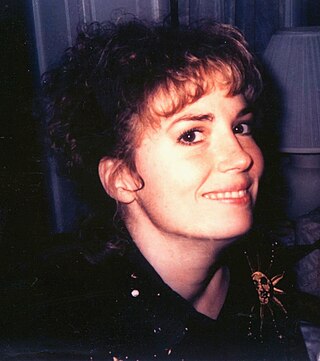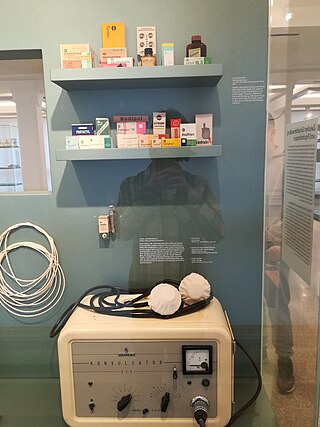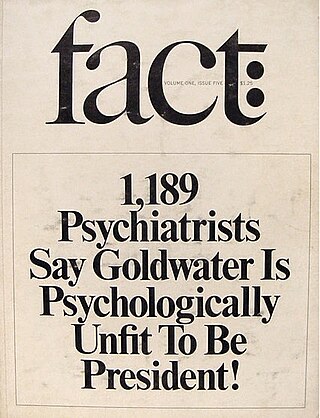
The Diagnostic and Statistical Manual of Mental Disorders is a publication by the American Psychiatric Association (APA) for the classification of mental disorders using a common language and standard criteria. It is the main book for the diagnosis and treatment of mental disorders in the United States and Australia, while in other countries it may be used in conjunction with other documents. The DSM-5 is considered one of the principal guides of psychiatry, along with the International Classification of Diseases (ICD), Chinese Classification of Mental Disorders (CCMD), and the Psychodynamic Diagnostic Manual. However, not all providers rely on the DSM-5 as a guide, since the ICD's mental disorder diagnoses are used around the world and scientific studies often measure changes in symptom scale scores rather than changes in DSM-5 criteria to determine the real-world effects of mental health interventions.
The American Psychiatric Association (APA) is the main professional organization of psychiatrists and trainee psychiatrists in the United States, and the largest psychiatric organization in the world. It has more than 38,000 members who are involved in psychiatric practice, research, and academia representing a diverse population of patients in more than 100 countries. The association publishes various journals and pamphlets, as well as the Diagnostic and Statistical Manual of Mental Disorders (DSM). The DSM codifies psychiatric conditions and is used mostly in the United States as a guide for diagnosing mental disorders.

The Rosenhan experiment or Thud experiment was an experiment conducted to determine the validity of psychiatric diagnosis. Participants submitted themselves for evaluation at various psychiatric institutions and feigned hallucinations in order to be accepted, but acted normally from then onward. Each was diagnosed with psychiatric disorders and were given antipsychotic medication. The study was conducted by psychologist David Rosenhan, a Stanford University professor, and published by the journal Science in 1973 under the title "On Being Sane in Insane Places".

There was systematic political abuse of psychiatry in the Soviet Union, based on the interpretation of political opposition or dissent as a psychiatric problem. It was called "psychopathological mechanisms" of dissent.
Louis Jolyon West was an American psychiatrist involved in the public sphere, known mainly for his work/involvement with the MKUltra project, a CIA mind control project in the late 1960s.

The World Psychiatric Association is an international umbrella organisation of psychiatric societies.

Since the founding of the Church of Scientology in 1954 by L. Ron Hubbard, the relationship between Scientology and psychiatry has been dominated by strong opposition by the organization against the medical specialty of psychiatry and of psychology with themes relating to this opposition occurring repeatedly throughout Scientology literature and doctrine. According to the Church of Scientology, psychiatry has a long history of improper and abusive care. The group's views have been disputed, criticized, and condemned by experts in the medical and scientific community and have been a source of public controversy.
Robert Leopold Spitzer was a psychiatrist and professor of psychiatry at Columbia University in New York City. He was a major force in the development of the Diagnostic and Statistical Manual of Mental Disorders (DSM).
Child and adolescent psychiatry is a branch of psychiatry that focuses on the diagnosis, treatment, and prevention of mental disorders in children, adolescents, and their families. It investigates the biopsychosocial factors that influence the development and course of psychiatric disorders and treatment responses to various interventions. Child and adolescent psychiatrists primarily use psychotherapy and/or medication to treat mental disorders in the pediatric population.

Psychiatry is the medical specialty devoted to the diagnosis, prevention, and treatment of deleterious mental conditions. These include various matters related to mood, behaviour, cognition, perceptions, and emotions.
This is a timeline of the modern development of psychiatry. Related information can be found in the Timeline of psychology and Timeline of psychotherapy articles.
The Critical Psychiatry Network (CPN) is a psychiatric organization based in the United Kingdom. It was created by a group of British psychiatrists who met in Bradford, England in January 1999 in response to proposals by the British government to amend the Mental Health Act 1983. They expressed concern about the implications of the proposed changes for human rights and the civil liberties of people with mental health illness. Most people associated with the group are practicing consultant psychiatrists in the United Kingdom's National Health Service (NHS), among them Dr Joanna Moncrieff. A number of non-consultant grade and trainee psychiatrists are also involved in the network.
The Indian Psychiatric Society (IPS) is the oldest professional association of psychiatrists in India. Founded during the 34th Indian Science Congress, IPS replaced the Indian division of the Royal Medico-Psychological Association.

Kenneth S. Kendler is an American psychiatrist best known for his pioneering research in psychiatric genetics, particularly the genetic causes of schizophrenia. Kendler is one of the highest cited psychiatry researchers. Between 1990 and 1998 he was the 2nd highest cited psychiatrist, and for the 1997–2007 decade he was ranked 4th by Thomson Reuters' Science Watch. He has authored over 1,200 papers and in 2016 his h-index was 126. Kendler's group was also noted for the replication of a study of Avshalom Caspi on the interaction of stressful life events and a serotonin transporter polymorphism in the prediction of episodes of major depression.

The Goldwater rule is Section 7 in the American Psychiatric Association's (APA) Principles of Medical Ethics, which states that psychiatrists have a responsibility to participate in activities contributing to the improvement of the community and the betterment of public health, and when they are asked to comment on public figures, they refrain from diagnosing, which requires a personal examination and consent. It is named after former US Senator and 1964 Republican presidential nominee Barry Goldwater.

In the Soviet Union, systematic political abuse of psychiatry took place and was based on the interpretation of political dissent as a psychiatric problem. It was called "psychopathological mechanisms" of dissent.
Eli Robins was an American psychiatrist who played a pivotal role in establishing the way mental disorders are researched and diagnosed today.

The Working Commission to Investigate the Use of Psychiatry for Political Purposes was an offshoot of the Moscow Helsinki Group and a key source of information on psychiatric repression in the Soviet Union.
Homosexuality was classified as a mental disorder in the Diagnostic and Statistical Manual of Mental Disorders (DSM) beginning with the first edition, published in 1952 by the American Psychiatric Association (APA). This classification was challenged by gay rights activists during the gay liberation following the 1969 Stonewall riots, and in December 1973, the APA board of trustees voted to declassify homosexuality as a mental disorder. In 1974, the DSM was updated and homosexuality was replaced with a new diagnostic code for individuals distressed by their homosexuality, termed ego-dystonic sexual orientation. Distress over one's sexual orientation remained in the manual, under different names, until the DSM-5 in 2013.

Psychiatric Annals is a monthly peer-reviewed review journal covering the field of psychiatry. It is published by Slack and the editor-in-chief is Andrew A. Nierenberg.









